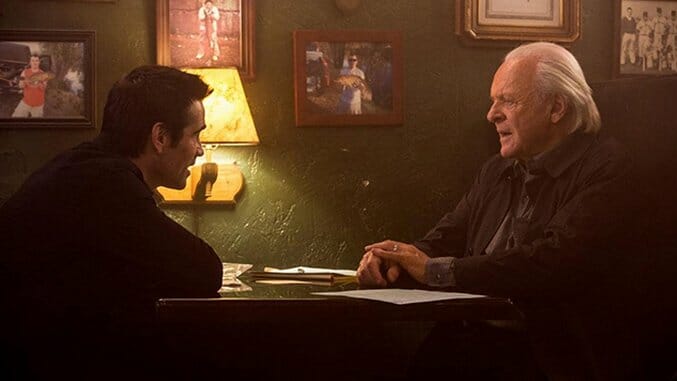
The advertising materials for Solace give away what the film seemingly intends to be a mind-blowing, mid-narrative twist: the reveal of the killer. Enter a heretofore unseen character named Charles Ambrose (Colin Farrell) who just suddenly pops into a diner booth in which psychic investigator John Clancy (Anthony Hopkins) forlornly sits to lay out his game plan and motivations. Unlike, say, John Doe in Seven, Charles isn’t ready to be caught just yet, which turns the rest of Afonso Poyart’s vaguely supernatural detective thriller into—even more crazily—a showdown between psychics.
If you had gone into the film knowing nothing about it, as I did, then Farrell’s out-of-nowhere appearance and the subsequent twists and turns might have induced a feeling of genuine exhilaration in how balls-out ridiculous everything gets. (Imagine two psychics standing in a lavishly upholstered apartment carrying on a heated philosophical argument while Charles’s intended victim simply sits at a dinner table, staring at both of them in disbelief—that ridiculous.) Suddenly, a cheesy throwback to all those generic 1990s serial-killer procedurals (remember Copycat? Kiss the Girls? The Bone Collector?) acquires at least vestiges of an identity of its own.
Whether it’s worth sitting through the rest to get to this nutty last act is more debatable. There’s a germ of an interesting idea underpinning Poyart’s film. Detective Joe Merriwether (Jeffrey Dean Morgan) enlists friend/psychic Clancy to help him and partner Katherine Cowles (Abbie Cornish) track down a serial killer who targets victims with terminal illnesses. Essentially, it’s “mercy killing” taken to a gruesome extreme. There are just enough scenes of earnest discussion about the morality of such a God-playing stance in Sean Bailey and Ted Griffin’s screenplay that occasionally Solace disturbs on a deeper level than the shock tactics Payart employs to ostensibly rattle us.
Mostly, though, the blatant derivativeness of the plot or Poyart’s show-off-y style obscure the moral questions Solace gingerly raises. The aforementioned Seven is an obvious point of comparison; if John Doe could see into men’s corrupt souls (at least from his own viciously judgmental perspective), Charles Ambrose can go even further and divine people’s deaths. Ambrose’s and Clancy’s supernatural abilities also allude to “Clyde Bruckman’s Final Repose,” the great X-Files episode about a man who could see how people died just by looking at them. Most overt reference of all, however, is The Silence of the Lambs, especially with Hopkins—who also served as this film’s executive producer—shamelessly redoing Hannibal Lecter at certain points. His performance might seem on autopilot if his distinct speech cadences didn’t sell the Lecter redux so damn well.
Worse than Solace’s blatant reliance on its predecessors is a visual style that, when it’s not too busy trying to induce shock and awe with noisy, dream-like psychic montages, seems content to ape the endlessly roving camera style that has become the predominant aesthetic of many a CBS crime drama. There’s no reason that a conventional interrogation scene needs to have a camera spinning 360º around a room, other than that Poyart—and anyone who’s ever directed episodes of CSI or NCIS—believes he’s the next coming of Brian De Palma. The closest Poyart comes to a visual signature is his taste for mirror- and glass-reflection shots of characters, and even then such images are bound to induce more unintentional giggles than anything else. Pointlessly “cinematic,” all of these third-rate attempts at surrealism are ironic considering Solace barely seems interested in psychic phenomena at all, using it merely as a trope to freshen up what is otherwise a standard crime procedural.
With that last act, one’s annoyance toward the off-the-shelf plot parts and cheesy visual gimmicks may well subside for a bit. Then, however, comes a final twist which reminds us of why Solace ultimately fails as both a genre piece and a character drama: Poyart and the screenwriters are completely disengaged from the inner lives of any of their characters. When we find out something crucial about Clancy’s past that gives him a connection of sorts to Ambrose, the twist has no emotional punch whatsoever. The ultimate failure: The whole enterprise ends up as soulless as it is silly.
Director: Afonso Poyart
Writers: Sean Bailey, Ted Griffin
Starring: Anthony Hopkins, Jeffrey Dean Morgan, Abbie Cornish, Colin Farrell, Marley Shelton, Xander Berkeley.
Release Date: December 16, 2016
Kenji Fujishima is a freelance film critic, contributing to Slant Magazine, Brooklyn Magazine, The Playlist and The Village Voice. He is also Deputy Editor of Movie Mezzanine. When he’s not watching movies and writing and editing film criticism, he’s trying to absorb as much music, art and literature as possible. He has not infrequently been called a “culture vulture” for that reason.